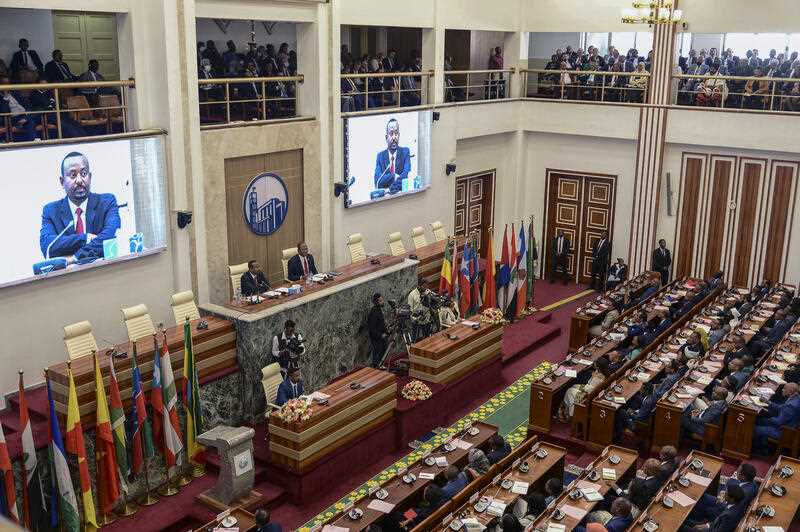When Fortuna Berhane thinks about her family back in Ethiopia, it is with a mix of concern, frustration and guilt.
A two-year civil war that in reality more closely resembles a genocide has given the 25-year-old plenty of reason to fear for the wellbeing of her loved ones.
Ethnic Tigrays in the county’s north have been the target of war crimes and other atrocities by Ethiopian government forces fighting the region’s ruling party, according to multiple reports by human rights and academic groups.
Tigrayan forces have also been identified as being involved in killing civilians, sexual violence and other abuses.
“All of my extended family is in Ethiopia and mostly in Tigray,” Ms Berhane tells AAP.
“My cousins, uncles, aunties, little nieces and nephews, I can’t imagine what they’re going through right now.”
To the frustration of many others in Australia with ties to the region, reports of famine, rape and murder have been met with relative inaction by a global community more concerned about events in Ukraine.
Humanitarian aid from Australia to Ethiopia pales in comparison to the $500 million provided to help with the war in Europe.
“The international community has been focused on the Ukraine crisis,” says Deborah Mayersen, a senior lecturer and genocide expert from the University of NSW.
“Unfortunately, there is a reality that these kinds of crises in Africa tend to get less attention.”
A tenuous peace agreement reached at the start of this month provided a window of opportunity for aid to get through to Ethiopia, but countries like Australia have to act fast, Dr Mayersen says.
“We need to use this moment to pressure the Ethiopian government to get that peace agreement to hold and get as much aid into the region to save lives while it does.”
It’s estimated somewhere between 230,000 and 350,000 Tigrayans have died from famine because of a government blockade, which has prevented food, medicines and other supplies getting into the region.
This is on top of the unknown thousands killed by violence, including at the hands of forces from neighbouring Eritrea, which are accused of committing some of the worst atrocities.
The United Nations estimates around 5.2 million people in Tigray are experiencing severe hunger and need immediate help.
In response to the crisis, Australia donated $6 million to the World Food Programme as well as $15 million to help address hunger crises in the Horn of Africa more broadly.
Ms Berhane and others are calling on the Australian government to do much more, including granting asylum to Tigrayan refugees, many of whom have fled into neighbouring Sudan.
The Australian Tigray Alliance is hosting an exhibition of photos and other information about the conflict, which opened in Canberra on Thursday.
Ms Berhane says it is incredibly frustrating to see the conflict that has touched her so deeply go unnoticed in her adopted country.
“Everything around you goes on as if nothing’s happening. I imagine what things are happening to people just for having my ethnicity,” she says.
In November 2020, up to 800 people were massacred in Axum, the city where Ms Berhane was born and lived until she was nine.
“It’s just so horrifying because that could easily be me,” she says.
Since the blockade was introduced in late June 2021, the region has been without internet, electricity, banking, communications and other key services.
The US has taken a firm stance on the conflict, which Secretary of State Antony Blinken last year labelled as “ethnic cleansing”.
“Australia really needs to come to the party, we’re out of step with the US on this,” Dr Mayersen says.
Australia is a signatory to the Responsibility to Protect principle, adopted at the 2005 UN World Summit, which compels countries to act to help prevent crimes against humanity, war crimes, ethnic cleansing and genocide.
“Australia needs to take its place as a supporter of human rights in the international community by condemning these mass atrocities, by calling on the Ethiopian government to adhere to the peace agreement and allow unfettered humanitarian access, as a bare minimum,” Dr Mayersen says.
Ms Berhane points out that Australia has called for an end to hostilities in Ethiopia before but has failed to discern between the actions of the sides, which serves to legitimise the government’s atrocities.
“Painting this situation as though parties are committing the same atrocities and just involved in battle is part of the problem,” she says.
Dr Mayersen adds, “It would be equivalent to calling on all parties to the conflict between Ukraine and Russia to cease hostilities and respect human rights.
“We know that when wars happen all parties commit war crimes – it’s deplorable but true. But in cases (like this), you can see a clear aggressor.”
A spokeswoman for the Department of Foreign Affairs and Trade says the Australian government welcomes this month’s peace agreement and ceasefire.
“We recognise the significant distress felt by Australians whose families and friends have been impacted by the conflict in Tigray,” she says.
By Duncan Murray in Sydney



